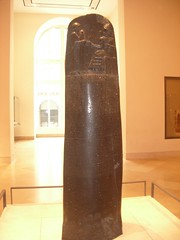The Code of Hammurabi [18th Century BCE]
Of the several law codes surviving from the ancient Middle East, the most famous after the Hebrew Torah is the Code of Hammurabi, sixth king of the Amorite Dynasty of Old Babylon. It is best known from a beautifully engraved diorite stela now in the Louvre Museum which also depicts the king receiving the law from Shamash, the god of justice. This copy was made long after Hammurabi's time, and it is clear that his was a long-lasting contribution to Mesopotamian civil ization.
It encodes many laws which had probably evolved over a long period of time, but is interesting to the general reader because of what it tells us about the attitudes and daily lives of the ancient Babylonians. In the following selection, most of the long prologue praising Hammurabi's power and wisdom is omitted.
samples of the laws:
15: If any one take a male or female slave of the court, or a male or female slave of a freed man, outside the city gates [to escape], he shall be put to death.
16: If any one receive into his house a runaway male or female slave of the court, or of a freedman, and does not bring it out at the public proclamation of the [police], the master of the house shall be put to death.
53: If any one be too lazy to keep his dam in proper condition, and does not so keep it; if then the dam break and all the fields be flooded, then shall he in whose dam the break occurred be sold for money, and the money shall replace the [grain] which he has caused to be ruined.
54: If he be not able to replace the [grain], then he and his possessions shall be divided among the farmers whose corn he has flooded.
108: If a [woman wine-seller] does not accept [grain] according to gross weight in payment of drink, but takes money, and the price of the drink is less than that of the corn, she shall be convicted and thrown into the water. (1)
109: If conspirators meet in the house of a [woman wine-seller], and these conspirators are not captured and delivered to the court, the [wine-seller] shall be put to death.
110: If a "sister of a god"[nun] open a tavern, or enter a tavern to drink, then shall this woman be burned to death.
129: If a man's wife be surprised [having intercourse] with another man, both shall be tied and thrown into the water, but the husband may pardon his wife and the king his slaves.
130: If a man violate the wife (betrothed or child-wife) of another man, who has never known a man, and still lives in her father's house, and sleep with her and be surprised [caught], this man shall be put to death, but the wife is blameless.
131: If a man bring a charge against [his] wife, but she is not surprised with another man, she must take an oath and then may return to her house.
132: If the "finger is pointed" at a man's wife about another man, but she is not caught sleeping with the other man, she shall jump into the river for [the sake of her] husband. (2)
138: If a man wishes to separate from his wife who has borne him no children, he shall give her the amount of her purchase money and the dowry which she brought from her father's house, and let her go.
141: If a man's wife, who lives in his house, wishes to leave it, plunges into debt [to go into business], tries to ruin her house, neglects her husband, and is judicially convicted: if her husband offer her release, she may go on her way, and he gives her nothing as a gift of release. If her husband does not wish to release her, and if he take another wife, she shall remain as servant in her husband's house.
142: If a woman quarrel with her husband, and say: "You are not congenial to me," the reasons for her prejudice must be presented. If she is guiltless, and there is no fault on her part, but he leaves and neglects her, then no guilt attaches to this woman, she shall take her dowry and go back to her father's house. (3)
More at World Civilization Reader.
Sunday, October 15, 2006
Subscribe to:
Post Comments (Atom)


No comments:
Post a Comment